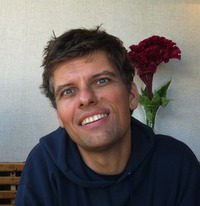Dr. Ir. Bernd Ensing
Postal address:
Van 't Hoff Institute for Molecular Sciences
University of Amsterdam
PO Box 94157
1090 GD Amsterdam, The Netherlands
Visiting address:
Science Park 904
1098 XH Amsterdam
room: C2.238
phone: (+31) 20 525 5067
email: b.ensing uva.nl
uva.nl
Curriculum Vitae
Bernd Ensing completed his PhD research in the group of prof. Evert Jan Baerends (VU, Amsterdam, January 2003) with a thesis entitled "Chemistry in water; first principles computer simulations". In this project, he studied the effects of solvation on the mechanism and rate of organic and inorganic reactions, using ab initio methods and Car-Parrinello molecular dynamics. He implemented and employed special rare events methods (umbrella sampling, method of constraint and transition path sampling) to deal with the fact that chemical reactions take place on a time scale that is much longer than the accessible simulation time.
In the group of prof. Michael Klein (October 2002 until Sepember 2005, UPenn, Philadelphia), he broadened his interest in chemical rare events to include conformational transitions in biological systems and complex fluids using classical methods and mesoscopic (coarse grained) dynamics. In collaboration with the Parrinello group, he worked on the development and application of advanced simulation techniques, such as the metadynamics method.
In September 2005, he started his second post-doctoral fellowship with prof. Michele Parrinello (ETH, Lugano, Switzerland). The research involved a number of projects that had as the common theme complex rare events. Inspired by the success of the hybrid QM/MM method, he developed a new multi-scale method that combines atomistic with coarse grained molecular dynamics. This new method is an important step forward to his aim to be able to accurately model and explain rare and non-equilibrium processes, while maintaining access to the electronic/atomistic details and the underlying physics.
In the summer of 2007, he was awarded the prestegious NWO Vidi grant, which allowed him to start his own independent research line in the Computational Chemistry group at the Universiteit van Amsterdam. Currently, his research interests are focussed on the study of multiscale modeling of photoactive proteins and the development of algorithms and computer code to do so.

